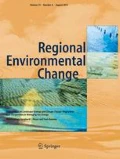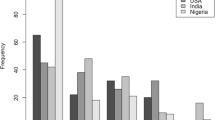Abstract
It has been widely acknowledged that people’s beliefs and perceptions influence implementation of climate change adaptation. Regarding perception barriers, some authors keep highlighting the confused definition of adaptation and its various interpretations. Our research contributes to this area by exploring how adaptation to climate change is perceived through 83 semi-structured interviews with stakeholders (public and municipal organizations, ENGO, private sector) from Montreal and Paris. Our results demonstrate a mirror opposition in the perception of adaptation to climate change. Indeed, while several respondents interpreted adaptation as a resignation, many interviewees perceived adaptation as an opportunity. The analysis showed that adaptation referring to resignation includes the ideas of a non-action and detrimental to mitigation; an excuse for not changing; anxiety about climate change; fatalism; and human failure. Adaptation perceived as an opportunity is divided into a source of creativity; toward sustainable development; led by the emergency; and awareness and making society of its responsibilities. Our findings confirm that terminological ambiguity of the term “adaptation” has to be considered in the decision-making process, which can be influenced by the perception of stakeholders.
Similar content being viewed by others
References
Adger WN, Barnett J (2009) Four reasons for concern about adaptation to climate change. Environ Plan A 41(12):2800–2805
Adger WN, Brown K, Fairbrass J, Jordan A, Paavola J, Rosendo S, Seyfangl G (2003) Governance for sustainability: towards a “thick” analysis of environmental decision-making. Environ Plan A 35(6):1095–1110
Adger WN, Dessai S, Goulden M, Hulme M, Lorenzoni I, Nelson DR, Naess LO, Wolf J, Wreford A (2009) Are there social limits to adaptation to climate change? Clim Change 93(3):335–354
Akerlof K, Maibach EW, Fitzgerald D, Cedeno AY, Neuman A (2013) Do people “personally experience” global warming, and if so how, and does it matter? Glob Environ Change 23:81–91
Alexievitch S (2004) La supplication: Tchernobyl, chronique du monde après l’apocalypse, traduction de Galia Ackerman et Pierre Lorrain, Éditions J’ai lu
Anderson NB (2011) Special issue: psychology and global climate change. Am Psychol 66(4):241–328
Basset TJ, Fogelman C (2013) Déjà vu or something new? The adaptation concept in the climate change literature. Geoforum 48:42–53
Biesbroek B, Klostermann J, Termeer C, Pavel K (2011) Barriers to climate adaptation in the Netherlands. Clim Law 2:181–199
Bord RJ, Fisher A, O’Connor RE (1998) Public perceptions of global warming: United States and international perspectives. Clim Res 11(1):75–84
Bowen KJ, Friel S (2012) Climate change adaptation: where does global health fit in the agenda? Glob Health 8(10):1–7
De Perthuis C, Hallegatte S, Lecocq F (2010) Economie de l’adaptation au changement climatique, Conseil économique pour le développement durable, France
Denton F, Wilbanks TJ, Abeysinghe AC, Burton I, Gao Q, Lemos MC, Masui T, O’Brien KL, Warner K (2014) Climate-resilient pathways: adaptation, mitigation, and sustainable development. In: Field CB, Barros VR, Dokken DJ, Mach KJ, Mastrandrea MD, Bilir TE, Chatterjee M, Ebi KL, Estrada YO, Genova RC, Girma B, Kissel ES, Levy AN, MacCracken S, Mastrandrea PR, White LL (eds) Climate change 2014: impacts, adaptation, and vulnerability Part A: global and sectoral aspects. Contribution of working group II to the fifth assessment report of the intergovernmental panel on climate change. Cambridge University Press, Cambridge, pp 1101–1131
Dessai S, Hulme M, Lempert R, Pielke R Jr (2009) Climate prediction: a limit to adaptation? In: Adger WN, Lorenzoni I, O’Brien KL (eds) Adapting to climate change: thresholds, values, governance. Cambridge University Press, Cambridge
Eriksen S, Aldunce P, Bahinipati CS, Martins RDA, Molefe JI, Nhemachena C, O’Brien K, Olorunfemi F, Park J, Sygna J (2011) When not every response to climate change is a good one: identifying principles for sustainable adaptation. Clim Dev 3:7–20
Eyzaguirre J, Warren FJ (2014) Adaptation: établir un lien entre la recherche et la pratique. In: Warren FJ, Lemmen DS (eds) Vivre avec les changements climatiques au Canada: perspectives des secteurs relatives aux impacts et à l’adaptation, Gouvernement du Canada, Ottawa (Ontario), pp. 253–286
Fatorić S, Morén-Alegret R (2013) Integrating local knowledge and perception for assessing vulnerability to climate change in economically dynamic coastal areas: the case of natural protected area Aiguamolls de l’Empordà. Ocean and Coastal Management, Spain. doi:10.1016/j.ocecoaman.2013.09.010
Füssel HM (2007) Adaptation planning for climate change: concepts, assessment approaches, and key lessons. Sustain Sci 2(2):265–275
Gardner GT, Stern PC (1996) Environmental problems and human behavior. Allyn and Bacon, Boston
Gifford R (2008) Psychology’s essential role in alleviating the impacts of climate change. Can Psychol 49:273
Grothmann T, Patt A (2005) Adaptive capacity and human cognition: the process of individual adaptation to climate change. Glob Environ Change 15(3):199–213
Hansson SO (2010) Risk: objective or subjective, facts or values. J Risk Res 13:231–238
Hulme M, Adger WN, Dessai S, Goulden M, Lorenzoni I, Nelson D, Naess LO, Wolf J, Wreford A (2007) Limits and barriers to adaptation: four propositions. Tyndall briefing note No. 20 Tyndall Centre for Climate Change Research
IPCC, 2013: Climate Change 2013: The Physical Science Basis. Contribution of Working Group I to the Fifth Assessment Report of the Intergovernmental Panel on Climate Change [Stocker, T.F., D. Qin, G.-K. Plattner, M. Tignor, S.K. Allen, J. Boschung, A. Nauels, Y. Xia, V. Bex and P.M. Midgley (eds.)]. Cambridge University Press, Cambridge, United Kingdom and New York, NY, USA, 1535 pp
Jones RN, Patwardhan A, Cohen SJ, Dessai S, Lammel A, Lempert RJ, Mirza MMQ, von Storch H (2014) Foundations for decision making. In: Field CB, Barros VR, Dokken DJ, Mach KJ, Mastrandrea MD, Bilir TE, Chatterjee M, Ebi KL, Estrada YO, Genova RC, Girma B, Kissel ES, Levy AN, MacCracken S, Mastrandrea PR, White LL (eds) Climate change 2014: impacts, adaptation, and vulnerability Part A: global and sectoral aspects. Contribution of working group II to the fifth assessment report of the intergovernmental panel on climate change. Cambridge University Press, Cambridge, pp 195–228
Kempton W (1993) Will public environmental concern lead to action on global warming? Annu Rev Energy Env 18:117–145
Koch I, Vogel C, Patel Z (2007) Institutional dynamics and climate change adaptation in South Africa. Mitig Adapt Strat Glob Change 12(8):1323–1339
Leiserowitz A (2006) Climate change risk perception and policy preferences: the role of affect, imagery, and values. Clim Change 77:45–72
Lorenzoni I, Pidgeon NF, Nicholson-Cole S, Whitmarsh L (2007) Barriers perceived to engaging with climate change among the UK public and their policy implications. Glob Environ Change 17(3–4):445–459
Lowe T, Brown K, Dessai S, de França Doria M, Haynes K, Vincent K (2006) Does tomorrow ever come? disaster narrative and public perceptions of climate change. Public Underst Sci 15:435
Moser S (2009) Making a difference on the ground: the challenge of demonstrating the effectiveness of decision support. Clim Change 95:11–21
Mustelin J, Kuruppu N, Matus Kramer A, Daron J, de Bruin K, Guerra Noriega A (2013) Climate adaptation research for the next generation. Clim Dev 5(3):189–193
Naess LO, Bang G, Eriksen S, Vevatne J (2005) Institutional adaptation to climate change: flood responses at the municipal level in Norway. Glob Environ Change 15:125–138
Noble IR, Huq S, Anokhin YA, Carmin J, Goudou D, Lansigan FP, Osman-Elasha B, Villamizar A (2014) Adaptation needs and options. In: Field CB, Barros VR, Dokken DJ, Mach KJ, Mastrandrea MD, Bilir TE, Chatterjee M, Ebi KL, Estrada YO, Genova RC, Girma B, Kissel ES, Levy AN, MacCracken S, Mastrandrea PR, White LL (eds) Climate change 2014: impacts, adaptation, and vulnerability. Part A: global and sectoral aspects. Contribution of working group II to the fifth assessment report of the intergovernmental panel on climate change. Cambridge University Press, Cambridge, pp 833–868
Norgaard KM (2006) “We don’t really want to know”: environmental justice and socially organized denial of global warming in Norway. Org Environ 19:347
O’Brien K (2009) Do values subjectivity define the limits to climate change adaptation? In: Adger WN, Lorenzoni I, O’Brien K (eds) Adapting to climate change: Thresholds, values, governance. Cambridge University Press, Cambridge, pp 164–180
O’Neill S, Nicholson-Cole S (2009) “Fear won’t do it”: promoting positive engagement with climate change through visual and iconic representations. Sci Commun 30:355–379
O’Brien K (2012) Global environmental change II from adaptation to deliberate transformation. Prog Hum Geogr 36:667–676
Paavola J, Adger NW (2005) Institutional ecological economics. Ecol Econ 53:353–368
Park SE, Marshall NA, Jakku E, Dowdd AM, Howden SM, Mendham E, Fleming A (2012) Informing adaptation responses to climate change through theories of transformation. Glob Environ Change 22(1):115–126
Patt A (2013) Should adaptation be a distinct field of science? Clim Dev 5(3):187–188
Pelling M (2011) Adaptation to climate change: from resilience to transformation. Routledge, London 224 pp
Piaget J (1967) Biologie et connaissance: essai sur les relations entre les régulations organiques et les processus cognitifs. Gallimard, Paris
Pielke R, Prins G, Rayner S, Sarewitz D (2007) Climate change 2007: lifting the taboo on adaptation. Nature 445:597–598
Reghezza M (2007) Adaptation (Capacité d’adaptation); École de géographie de Chicago; Écologie humaine; White G.F. (1911–2006). In: Veyret Y (ed) Dictionnaire de l’environnement. Armand Colin, Paris, pp 3–4
Reser JP, Morrissey SA, Ellul M (2011) The threat of climate change: psychological response, adaptation, and impacts. In: Weissbecker I (ed) Climate change and human well-being: global challenges and opportunities. Springer Science, New York, pp 19–42
Rickards L, Howden S (2012) Transformational adaptation: agriculture and climate change. Crop Pasture Sci 63:240–250
Schipper ELF (2006) Conceptual history of adaptation in the UNFCCC process. Rev Eur Community Int Environ Law 15(1):82–92
Simonet G (2010) The concept of adaptation: interdisciplinary scope and involvement in climate change, S.A.P.I.E.N.S. (3)1
Simonet G (2011) Enjeux et dynamiques de la mise en œuvre de stratégies d’adaptation aux changements climatiques en milieu urbain, les cas de Montréal et Paris. Dissertation, Université du Québec à Montréal
Simonet G (2013) Dynamiques et enjeux organisationnels autour de la problématique climatique. L’élaboration du Plan Climat de Paris 2007. In: de Bertrand F. et Rocher L, Peter Lang Ed (eds ) Les territoires face aux changements climatiques. Une première génération d’initiatives locales, sous la direction Coll Ecopolis 18: 269
Simonet G (2014) L’adaptation, champ de recherche à part entière ? in Adaptation aux changements environnementaux et territoires, numéro thématique Sud-Ouest Européen, sous la direction de Julien Rebotier, 37
Simonet G (2015) Why do the precise definitions about adaptation activities matter? L’imbroglio de l’adaptation, Natures, Sciences, Sociétés (special release for COP21-Paris)
Slovic P (2000) Rational actors and rational fools: the influence of affect on judgment and decision making. Roger Williams Univ Law Rev 6(1):163–212
Van Aalst MK, Cannon T, Burton I (2008) Community level adaptation to climate change: the potential role of participatory community risk assessment. Glob Environ Change 18:165–179
Wilbanks TJ, Kates RW (2010) Beyond adapting to climate change: embedding adaptation in responses to multiple threats and stresses. Ann Assoc Am Geogr 100(4):719–728
Acknowledgments
The authors would like to thank Claire Eschalier, Michael E. Cote and Professor Anthony Patt for their corrections and proofreading and the two anonymous reviewers for their constructive comments and supports.
Author information
Authors and Affiliations
Corresponding author
Additional information
Editor: James D. Ford.
Rights and permissions
About this article
Cite this article
Simonet, G., Fatorić, S. Does “adaptation to climate change” mean resignation or opportunity?. Reg Environ Change 16, 789–799 (2016). https://doi.org/10.1007/s10113-015-0792-3
Received:
Accepted:
Published:
Issue Date:
DOI: https://doi.org/10.1007/s10113-015-0792-3




